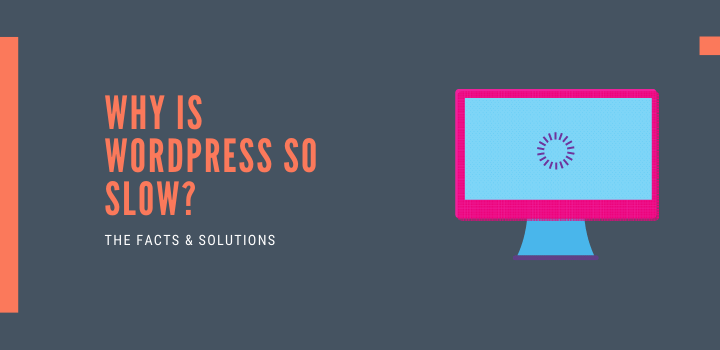Know the major facts of why is a WordPress site so slow and how to speed up a WordPress site using simple techniques.
WordPress is one of the most popular content management systems (CMS) in the world. It has over 60 million websites that are using it, and almost 30% of all new websites worldwide are built with WordPress.
However, this doesn’t mean that its speed is always perfect or even adequate. In fact, many users have reported a significant slow down after installing WordPress, which can make it difficult to use for some people on older devices or with limited internet connections.
You can read more guides about WordPress.
- How to Organize Your WordPress Blog? 8 Ways Explained
- 10 Benefits Of Learning WordPress With Other Opportunities!
- Is WordPress Secure? Read Our Resource-Based Answer
Why is WordPress So Slow: The Major Facts
WordPress relies heavily on PHP code to generate a webpage’s HTML from templates stored within your website’s directory structure. This means that any slowdowns can come from server resources being used by other sites hosted on the same server as well as plugins that may have been poorly coded to save time during development.

All these factors contribute towards why WordPress site becomes slower over time and needs fixing up often after installation.
The major facts are
- WordPress is slow because it’s not optimized for your site.
- The older hosting plan doesn’t have enough resources or bandwidth for a high-traffic blog.
- Too many plugins running at one time, even when they’re not in use. Plugins can cause data storage problems on your server if you don’t regularly update.
- Themes designed only with an appearance in mind rather than efficiency.
- Use of poorly coded WordPress theme and plugin.
- Not use the latest version of PHP in cPanel.
The above facts not only the reasons behind slow loading a WordPress site, but these are major. So you should identify first these points of your site.
Tips For Optimizing Speed of WordPress Sites
The first step to speed up your WordPress site is making sure that it’s optimized for a particular domain. Oftentimes, the hosting provider may install WordPress on an account with settings not suited for running this content management system (CMS). This can lead to slower load times and more vulnerability of your website to attacks.
In order to optimize a WordPress site, you’ll need the following steps:
- Be sure to purchase a domain name and have your hosting account set up with the proper settings.
- Optimize the size of your images by reducing file sizes through editing or using plugins like WordPress Smush Pro, Short Pixel Image Optimizer, or WP Smush It.
- Make use of caching plugins such as WP Rocket Cache for both Apache and NGINX servers. This will serve static files from their cache on subsequent page loads rather than regenerating them each time they’re requested, which can lead to faster load times. Don’t forget to use a speed optimizer plugin.
- Use an SSL certificate in order to speed up site loading speeds across all devices via encrypted communications that help protect against traffic analysis and data theft attempts (Wikipedia).
- Use a CDN service to deliver static content on a global network of servers to increase speeds and reliability.
- If you’re using WP Super Cache, make sure the cache is not set to expire after any arbitrary number of days.
- Disable all plugins except for those that are absolutely necessary (and even then, only use ones that will help in speeding up your site). Even if you don’t have an issue with plugin bloat yet, it might be time to consider how many processes running at once could affect your web server’s load times.
- Take care when choosing which hosting provider best suits your needs as some can cause more problems than others due to their slow page loading speed compared to other providers who offer better support services or solutions.
In Conclusion
Finally, we have reached the endpoint of this article. I hope you have enjoyed reading it and learned something new.
If after following the few tips I provided your WordPress site is still running slow, I recommend consulting with a WordPress developer to see if they can troubleshoot any issues that may be slowing down your website’s performance.
As always, feel free to comment below or reach out to us with any questions you may have! Thanks for taking the time in reading this article on why is WordPress so slow.